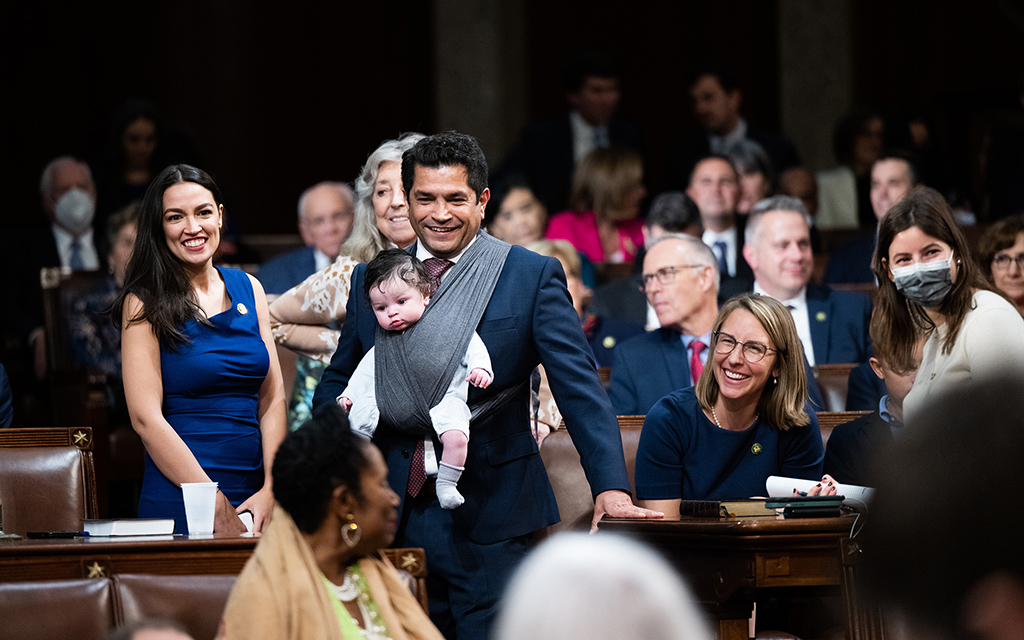WASHINGTON – Rep. Ruben Gallego was not the first member of Congress to take paternity leave, a benefit that is becoming increasingly common in workplaces around the country.
But that doesn’t mean it was considered routine when the Phoenix Democrat announced in early July that he planned to put aside his job as congressman temporarily to “do the job of dad first.”
“It’s very uncommon for members to take family leave. Members think they’ll be politically penalized for being parents,” said Brad Fitch, president and CEO of the Congressional Management Foundation.
There is no official record-keeping on family leave in Congress, but Gallego is at least the fourth House member to announce he was taking paternity leave, after Rep. Seth Moulton, D-Mass, in 2018, Rep. Colin Allred, D-Texas, in 2019 and Rep. Joaquin Castro, D-Texas, in 2022. Both Moulton and Allred took leave again in 2021 for the birth of other children.
While it’s rare in Congress, paternity leave is increasingly common in the private sector.
The Society for Human Resource Management reported in its annual survey of employee benefits this year that 40% of employers offer maternity leave in 2023 and 32% provide paternity leave. Except for a spike during the pandemic, the share of companies offering the benefit has hovered around one-third for the past five years.
Fitch said congressional offices set their own work policies, and it’s up to the member if and how long they want to be on parental leave. At the same time, the high work demand and responsibilities of Congress make it difficult for them to take leave.
Sydney and I are proud to welcome our daughter Isla into the world. These past few days together as a new family have been wonderful, and we are lucky that mom and daughter are healthy and home. pic.twitter.com/VcRlENvi9c
— Ruben Gallego (@RepRubenGallego) July 7, 2023
“It’s a 24/7/365 job, even if you’re not sitting in the halls of Congress,” agreed Lisa Sanchez, an assistant professor in the School of Government and Public Policy at the University of Arizona.
Gallego has not said how long he plans to be on paternity leave and his office declined requests for an interview while he is out with his wife and infant daughter.
While he’s been out of the office, he has not been off the grid. Since announcing his leave July 7, Gallego has issued statements, co-sponsored bills and signed on to a number of letters on topics ranging from Chinese influence in Latin America to the government’s response to the historic heat.
But he has also missed 92 roll call votes in that time. Unlike the second time Moulton and Allred took paternity leave during the pandemic, when the House allowed proxy voting for members who were not present, if Gallego misses a vote, he misses a vote.
“If they miss votes, there is no mechanism for members of Congress to vote when they have to engage in parental leave,” Fitch said. “The legislature hasn’t modernized some of the procedures for the modern workplace.”
Sanchez said it is unlikely that the House will revive proxy voting for members who are taking family leave. But she said the fact that members like Gallego are taking leave helps to make it “politically normalized” in Congress, which could help workplaces across the U.S. access the same policies.
Sanchez said there is another reason why members like Gallego might be taking parental leave; Congress is getting younger. Gallego is 43 and Moulton and Allred are both in their 40s.
Moulton said in a prepared statement that he was supported by his colleagues and constituents when he first took two weeks of paternity leave. For the arrival of his second daughter, in 2021, he took two months off partly due to that support, but also due to pandemic-era proxy voting, which let him vote from home.
“By and large, my colleagues and those that interacted with my team appreciated the transparency and respected my decision to step back and support my family,” Moulton said in a statement.
Rep. Jimmy Gomez, D-Calif., said in a prepared statement that Gallego “is setting a powerful example and breaking the stigma around dads putting their families first” by taking leave to be with his daughter.
Gomez launched the Congressional Dads Caucus in January after he made headlines for walking around the House floor, during a marathon voting session for speaker, with his infant son strapped to his chest in a baby carrier. Both Gallego and Allred are part of the caucus, whose mission is to advocate for legislation supporting working families, including increased access to child care and to paid family and medical leave.
“Any movement that members can make, including providing their own families and themselves with family medical leave, is a step in the right direction,” Fitch said.


